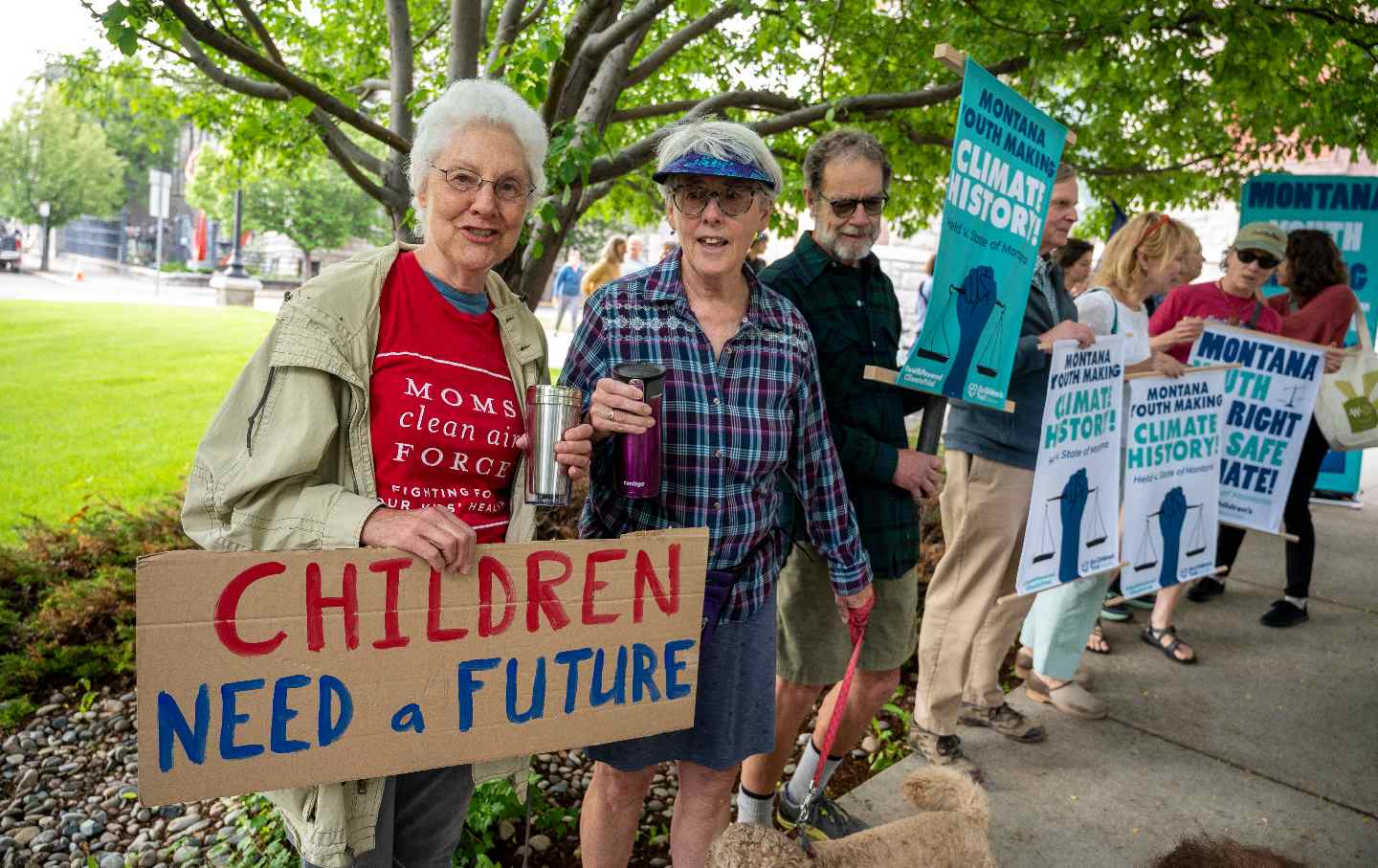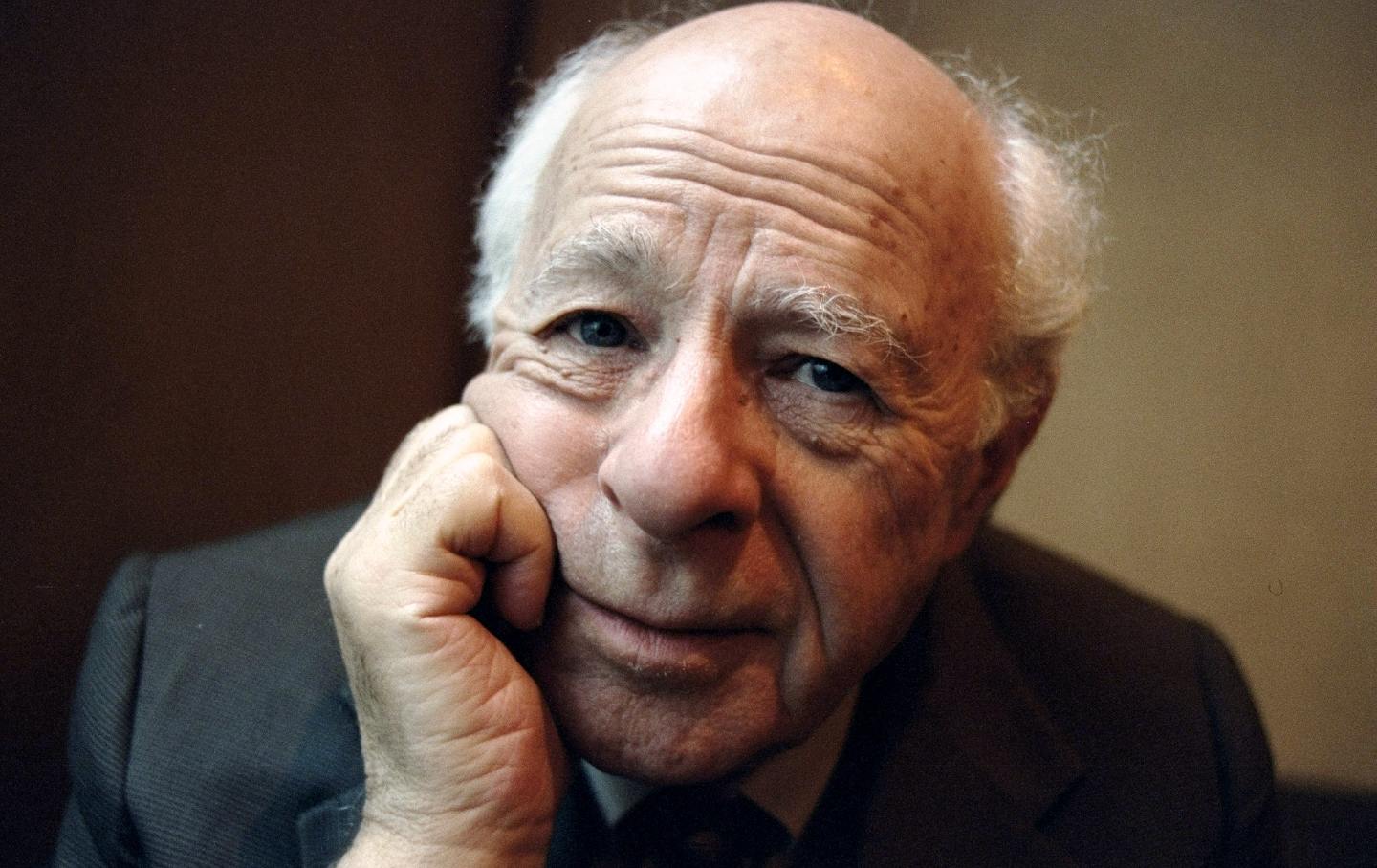Held v. Montana Is a Historic Victory for Climate Action—but Also Human Rights
“Held v. Montana” Is a Historic Victory for Climate Action—but Also Human Rights
Invoking the right to a healthy environment will likely become a replicable strategy for climate lawsuits across the country. “I see more and more of these trials happening.”

Supporters gather to greet plaintiffs as they arrive for the nation’s first youth climate change trial at Montana’s First Judicial District Court on June 12, 2023 in Helena, Montana
(William Campbell / Getty Images)On August 14, a Montana state court ruled in favor of the 16 youth plaintiffs who sued the state for anti-climate policies they argued were unconstitutional. The court’s landmark decision in Held v. Montana has been hailed as the first major climate litigation victory in the United States. But even as this case will help reverse some of Montana’s anti-climate policies, it will have an even broader significance, opening up further climate litigation that focuses on fundamental human rights.
The Montana youths, whose ages ranged from five to 22, challenged the constitutionality of the state’s fossil fuel–driven energy system, which they claimed was violating their explicit right to a “clean and healthful environment,” along with many of the permitting practices and policies that keep the system in place.
The youth activists’ victory in the case has all but ensured cascading ramifications for the future of Montana state legislation. The court ruling has already negated one of the most anti-climate laws passed by conservative lawmakers in the country—a Montana Environmental Policy Act provision barring state agencies from considering greenhouse gas emissions when permitting large energy projects that require environmental reviews, including coal mines and power plants.
The ripple effects of this historic decision could be significant in establishing new legal precedent that would create successful climate lawsuits in other states. Invoking the right to a healthy environment will likely become a replicable strategy for lawsuits in any state that has also explicitly acknowledged the right to a healthy environment in their state constitution. Such a list includes only a handful of states—Pennsylvania, New York, Massachusetts, Hawaii, Illinois, and Rhode Island—though the list seems to be slowly growing.
The plaintiffs’ case was supported by Our Children’s Trust, a nonprofit law firm providing legal services to youth seeking climate legal action. The organization has notably spearheaded the 2015 Juliana v. United States constitutional climate lawsuit, only recently approved for trial this past June, alongside several other pending state cases in its docket from Hawaii to Virginia.
“Young people are among the most politically powerless in this country. Most can’t vote and they don’t have the money to lobby their legislatures,” said Andrea Rodgers, senior litigator for Our Children’s Trust and one of the main attorneys working the Held case.
By targeting the entirety of the state system intensifying climate change, the youth plaintiffs’ case easily found the roots of its arguments in the state Constitution. Adopted in 1972, Montana’s Constitution dedicates a full article to its natural resources, explicitly outlining the state’s commitment to preserving its environment for present and future generations.
“I’m not aware of another state that comes close to the environmental and human health protections that are embedded in the Montana State Constitution,” said Deborah A. Sivas, Stanford University professor of environmental law.
Such direct legal language became incredibly powerful in the hands of young activists who sought to have Montana declare its extensive support for fossil fuels as unconstitutional, robbing its citizens of their right to a stable climate system.
In addition to passing the MEPA limitation, the state of Montana had done very little to promote the use of renewable energy. “There’s incredible renewable energy potential in Montana—wind, for example,” Rodgers said. “But when you look at the amount that the state has invested in fossil fuels compared to renewable energy projects, there’s a huge divergence there.”
The ultraconservative state legislature pulled out all the stops to deter the plaintiffs from even getting a trial, fighting them every step of the way. Between motioning for a dismissal of the case to filing emergency requests to take supervisory control of the case away from the trial judge—both of which failed—the state was extremely aggressive in its efforts to create several obstacles to derail the youth climate lawsuit.
“The state was dismissing us,” said 18-year-old plaintiff Kian Tanner. “It didn’t feel like we were being heard, which is sad because minors have the right to be heard in Montana. The state was trying to suppress that.”
Popular
“swipe left below to view more authors”Swipe →Rodgers, however, wasn’t surprised by the state’s actions. “It’s nothing new,” she said. “We’ve seen it in countless other systemic constitutional cases. Montana [was] using the same kind of defenses that were used early on in the civil rights cases that led to Brown v. Board of Education. They have a playbook, and unfortunately it hasn’t changed over the years.”
On the stand, the plaintiffs testified how the severity of climate change—exacerbated by Montana’s disregard for greenhouse gas emissions—has contributed negatively to their physical and mental wellbeing. Tanner, for example, has seen the severe impacts of climate change firsthand. In addition to degrading his family property, wildfire smoke coupled with extreme heat have harmed his ability to fish and play soccer—activities he considers critical for his emotional health.
While the plaintiffs brought forward a number of witnesses, backing their argument with scientific data, in a surprising—or unsurprising—turn of events, the trial concluded three days earlier than predicted for one reason: The state of Montana barely defended itself. Of the mere three witnesses representing the state, one presented inaccurate numbers and the other two were agency employees who didn’t contradict the vast majority of evidence that was presented by the plaintiffs, according to Rodgers.
“[The state] really [did] not have a leg to stand on,” she said. “There’s no factual reason to prioritize fossil fuels [over renewable energy]. The harms are so well documented and it’s no longer economic.”
The case of Held v. Montana largely contrasts the norms established for climate litigation across the country. Over the past 40 years, the majority of climate cases have centered on narrow and specific government actions—regulations on fuel efficiency standards or permits for individual projects, for example, according to Rodgers.
What made Held v. Montana unique was its human rights-based approach to climate litigation. Instead of arguing that young Montana citizens have certain statutory rights—rights granted or established by legislation—the plaintiffs argued that it was really their fundamental human constitutional rights at stake because of climate change, including their rights to life, liberty, and equality under the law.
“In court, we [weren’t] asking governments to be held accountable for their political commitments [like the Paris Agreement], but rather what science says needs to be done to protect the fundamental rights of children,” said Rodgers.
For that reason, the impacts of the plaintiffs’ victory in the Held case may reverberate far beyond the United States. Internationally, the nation has long been a laggard in terms of recognizing and protecting the human rights–based legal implications of climate change.
“There’s always been a strong aversion to linking environmental issues to human rights in this country,” Rodgers said. “The US is always first in line to vehemently fight against any kind of notion that there are fundamental rights tied to a healthy environment.”
From Germany to the Philippines, courts in other jurisdictions all over the world have already handed down landmark decisions on identifying the link between climate change and human rights. Almost 280 rights-based climate cases have been actively litigated or already completed globally. Held v. Montana being the first case to even lead to a court ruling in the US makes the country a straggler on the international scale.
“The US judiciary is only just catching up with the rest of the world,” said Cesar Rodríguez-Garavito, professor of clinical law at New York University. “Most constitutional democracies have, in one way or another, legally acknowledged the connection of climate change and human rights.”
Though there may be an explanation for this trend. According to Rodríguez-Garavito, unlike in Europe, where litigants are able to invoke regional and international treaties—such as the European Convention on Human Rights—to make their case before domestic courts, US courts tend to be impermeable to arguments taken from international human rights laws and doctrines.
With the Held case, that may be starting to change.
“I see more and more of these trials happening,” Rodgers said. “The hope is that, within the next few years, instead of fighting to get access to our courts, we’re going to be enforcing remedies and holding the governments accountable to implement policies that actually protect these young people’s constitutional rights.”
Disobey authoritarians, support The Nation
Over the past year you’ve read Nation writers like Elie Mystal, Kaveh Akbar, John Nichols, Joan Walsh, Bryce Covert, Dave Zirin, Jeet Heer, Michael T. Klare, Katha Pollitt, Amy Littlefield, Gregg Gonsalves, and Sasha Abramsky take on the Trump family’s corruption, set the record straight about Robert F. Kennedy Jr.’s catastrophic Make America Healthy Again movement, survey the fallout and human cost of the DOGE wrecking ball, anticipate the Supreme Court’s dangerous antidemocratic rulings, and amplify successful tactics of resistance on the streets and in Congress.
We publish these stories because when members of our communities are being abducted, household debt is climbing, and AI data centers are causing water and electricity shortages, we have a duty as journalists to do all we can to inform the public.
In 2026, our aim is to do more than ever before—but we need your support to make that happen.
Through December 31, a generous donor will match all donations up to $75,000. That means that your contribution will be doubled, dollar for dollar. If we hit the full match, we’ll be starting 2026 with $150,000 to invest in the stories that impact real people’s lives—the kinds of stories that billionaire-owned, corporate-backed outlets aren’t covering.
With your support, our team will publish major stories that the president and his allies won’t want you to read. We’ll cover the emerging military-tech industrial complex and matters of war, peace, and surveillance, as well as the affordability crisis, hunger, housing, healthcare, the environment, attacks on reproductive rights, and much more. At the same time, we’ll imagine alternatives to Trumpian rule and uplift efforts to create a better world, here and now.
While your gift has twice the impact, I’m asking you to support The Nation with a donation today. You’ll empower the journalists, editors, and fact-checkers best equipped to hold this authoritarian administration to account.
I hope you won’t miss this moment—donate to The Nation today.
Onward,
Katrina vanden Heuvel
Editor and publisher, The Nation
More from The Nation

The Longest Journey Is Over The Longest Journey Is Over
With the death of Norman Podhoretz at 95, the transition from New York’s intellectual golden age to the age of grievance and provocation is complete.

The Shocking Confessions of Susie Wiles The Shocking Confessions of Susie Wiles
Trump’s chief of staff admits he’s lying about Venezuela—and a lot of other things.

The King of Deportations The King of Deportations
ICE’s illegal tactics and extreme force put immigrants in danger.

The Epstein Survivors Are Demanding Accountability Now The Epstein Survivors Are Demanding Accountability Now
The passage of the Epstein Files Transparency Act is a big step—but its champions are keeping the pressure on.

Mayor of LA to America: “Beware!” Mayor of LA to America: “Beware!”
Trump has made Los Angeles a testing ground for military intervention on our streets. Mayor Karen Bass says her city has become an example for how to fight back.

Breaking the LAPD’s Choke Hold Breaking the LAPD’s Choke Hold
How the late-20th-century battles over race and policing in Los Angeles foreshadowed the Trump era.


